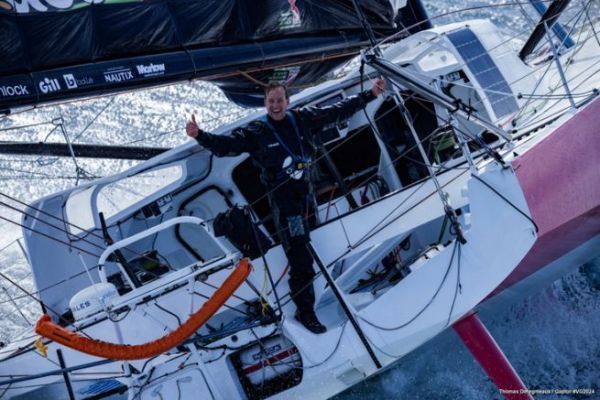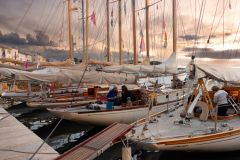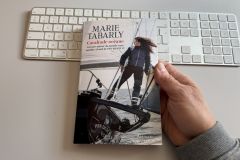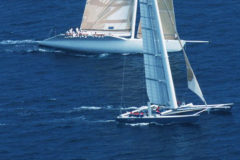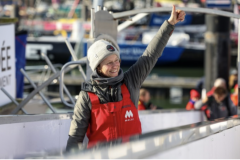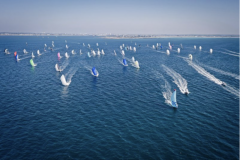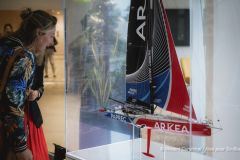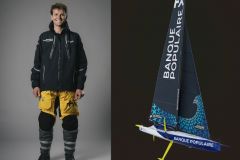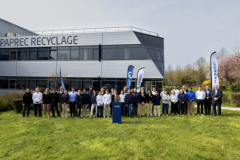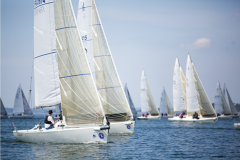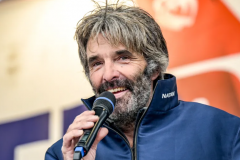Conrad Colman is originally from New Zealand, but grew up in the United States. One day, he discovered the Vendée Globe and left everything behind for France, where he could realize his dream. A dream he fulfilled in 2016 on his first round-the-world voyage, which unfortunately was not a smooth ride. We all remember his dismasting and arrival in Les Sables-d'Olonne under jury rig. At the time, he was the first sailor to complete a Vendée Globe without fossil fuels. Due to a lack of sponsors, he did not take part in the 2020 edition, but is back for this 10th edition on the IMOCA MS Amlin, Maxime Sorel's former boat in 2020, with one of the smallest budgets in the fleet. Once again, he's relying solely on the elements to complete his circumnavigation, and hopes to climb the ladder to a bigger project in 2028.
What does a fossil-free round-the-world trip mean to you? What are your convictions about setting off a second time in this configuration?
I'm a great believer in the idea of using renewable energy for a round-the-world race. Sailing has the chance to be a pioneer in showing the power of renewable energy. It's something that's close to my heart.
Today, people still wonder whether solar panel or electric motor technology is really mature, reliable and sustainable... I'm setting off with solar panels for 45,000 km around the world, and I'm going to prove that it works great. So why shouldn't it work to fetch milk for the family?
When I fell in love with the Vendée Globe, I came across this quote from Bilou (NB: nickname of skipper Roland Jourdain) who said, the Vendée Globe is quite simple, you start from a place, you come back to the same place, you're pushed by the wind. What I'd like to add to this principle is that you're pushed by the wind and you should be pushed by the sun. In 2016, I showed that it was possible. More and more boats are increasing the amount of solar panels on board. For me, it's a conviction not to have fossil fuels on board.
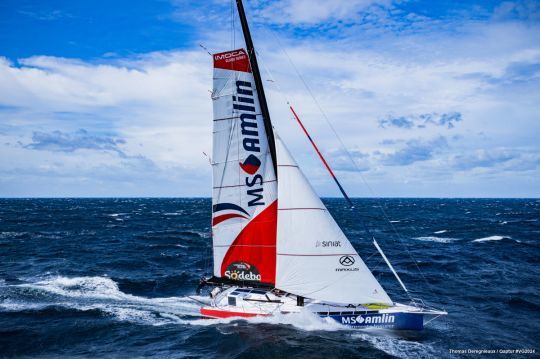
How do you equip your IMOCA in this respect?
It's simple, it's more or less the same as for everyone else. For them it's a back-up, for me it's my primary means. In 2016, I obtained a waiver to replace the combustion engine with an Ocean Volt electric motor, the same system currently installed on the Hublot boat. But since Kevin Escoffier's recovery in the last Vendée Globe, the class has imposed the combustion engine as a safety feature. I don't necessarily agree. I've already rescued someone in the water, and often the boat is more maneuverable under sail than under engine, especially in ocean conditions.
So I'm keeping the combustion engine, on which I'm going to install an extra lead to prove that I won't be using it, in addition to the propeller lead.
I'm going to use only solar panels and the Watt&Sea hydrogenerator. So I'm going to increase my storage capacity. I have bigger batteries that give me 2 days of autonomy. In the worst-case scenario, if I'm stuck in the doldrums and can't charge either with speed or with the sun, I've got enough to last.
I have a few fewer screens, and a power-saving mode for endurance. I can also store a little more water than the others. For the Doldrums, I'm going to run the watermaker upstream and not during, to minimize energy consumption at that time.
You have to be a bit strategic. There are phases that we've analyzed with our routing, where I'll be less efficient when charging and full of water. Having almost 3,000 watts of solar panel power means I can be autonomous for several days and not have to think about when I need to charge. It takes the mental load off my shoulders, which is quite critical in ocean racing. It's also nicer not to have the smells, the noise...
In conclusion, it's more reliable and lighter, so it doesn't affect performance.
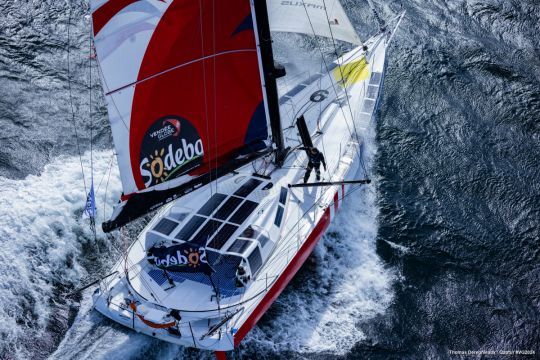
Won't having more batteries affect the boat's weight/performance ratio?
No, because I don't have 200 liters of diesel. I've got 40 kilos of battery, so overall it's lighter. I also have 2 energy systems to run the boat, either solar, hydro or both. This increases reliability compared with boats that only have one.
I would only have the obligatory 20 L of diesel to cut the line. They are sealed and inspected on arrival. Other boats often start with a main tank and this spare tank.
Communication at sea is energy-intensive. Do you plan to limit or anticipate your communications, as you do with water and energy?
We have 2 satellite communication systems on board. The Certus iridium is mandatory and provided by the class because of a partnership with them. For the second communication system, there's either Inmarsat or Starlink, which I've chosen. It seems to be reliable. This is the first year we've put these antennas on our boat, and it took a while to finalize them. We've got Internet just like at home, but it does consume more energy... The Certus will be running all the time to download the weather, cover tracker needs, WhatsApp and basic connection. As soon as I do a live stream or send a heavy communication, I'll switch on the Starlink.
How did you come to choose recyclable sails? How are they made?
These are OneSails. Today, the big sailmakers are North, Incidence, Doyle, All Pupose and One. Doyle and North are made in Nevada, so they're very far away. There's a big transport impact. On the closer circuit, Incidences manufactures locally, as does All Purpose, but the former uses epoxy resin with DFI Fit fiber, which is kept in the freezer, and the latter has no recycling system.
My sails are made in Europe, in Italy, with solar panels, and without VOCs (Volatile Organic Compounds). What remains unique among all the other products mentioned is that the material used is purely plastic. All layers are bonded together using heat. The fibers and the sealing membrane are made of the same material. There's no risk of delamination, since they're fused together. They can also be easily remelted. Sunglasses, for example, are made from sails that have already been around the world.
These sails are tough enough to cope with the world's most extreme conditions. It's a shame to abandon them at the end of the Vendée Globe, when we could be reusing materials.
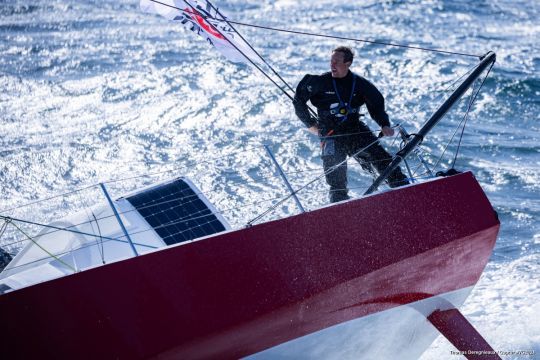
You bought Maxime Sorel's old IMOCA in 2021, which a priori made you want to start ocean racing, why?
That's not quite true, because the desire was already well established. I was a mountain biker in Colorado. I decided when I read about the Vendée Globe in the newspapers that it was really cool. It was like love at first sight, and I left the United States and everything around me to come to France and do the Vendée Globe. I came to the start of the 2008 Vendée Globe, and Groupe Bel was there (Editor's note: the first name of his boat) was one of the first boats I saw on the pontoons of Port Olona. I said to myself that one day I'd like a boat like that... And I did. I should have been more precise when I said a recent, better-equipped boat...
Your boat dates back to 2007. How have you optimized it for this Vendée Globe? Will she still be up to standard in 2028?
Yes, she'll still be up to standard for the next Vendée Globe. We've done a lot of things, because this is a boat that's had quite a few mishaps, notably with Kito de Pavant: dismasting, collision, abandonment... Then it broke in two with Thomas Ruyant. She had the reputation of being a very fast boat at the time, but also rather fragile. After my Vendée Globe in 2016, I realized that I tend to sail with my foot to the floor, like Thomas and Maxime, and I didn't want to break the boat.
We found a crack in the original keel sail. We had to change it, which put the boat out of service for the whole of last year. We put her back in the water just before the Jacques Vabre 2023.
We took advantage of the opportunity to use the scissors to optimize the boat right down to the black box. We stripped her down to her Groupe Bel red color. Additional layers of carbon were applied to the outside of the boat to strengthen it. To lighten it, we reorganized the ballast system. We did everything that other teams hadn't done with this boat, mainly due to lack of time. My colleagues on daggerboard boats have upgraded theirs, so I had to upgrade mine so that I could stay with them.
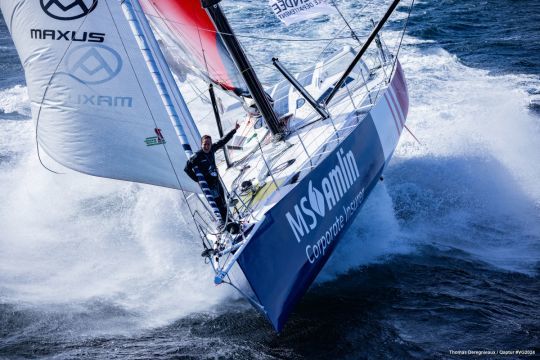
Apart from equipping your boat, what other measures have you taken to reduce your impact on the environment during the Vendée Globe?
I'll be bringing along scientific sensors with buoys that we'll drop and sensors in the boat. These passages serve more than just sending pretty pictures and seeing dolphins. It's about getting real values. These measurements will increase the frequency and density of data collection, which will have an impact on weather and climate models in the broader sense.
You say you're a vegetarian. What nutritional measures are you going to put in place to make up for the absence of meat?
Being vegetarian also has an impact, as it's a lighter carbon diet. I've been a vegetarian for 13 or 14 years, and it's never stopped me from performing on a bike or sailing. I'll be eating freeze-dried food like the others, and lots of nuts and dried fruit. I take protein shakes and a packet of olive oil. It's a good way of increasing the calories consumed, like freeze-dried parmesan melted into a pasta dish.
Have you set yourself a goal for this Vendée Globe? And if so, what is it?
I think you're going to have a hard time getting the real answer from everyone... On the one hand, we don't want to show off too much, while at the same time having a lot of admiration for the sailors who'll be out at sea.
One: to finish, two: to finish with the mast, which was missing on the first edition, and three: to have fun. The last edition was really tough, with a fire and dismasting. I'd like to take advantage of the experience I've accumulated and my ability to sail well with this boat, which is still old, but high-performance. We're going to lay the foundations for another cycle.
How are you preparing for the Vendée Globe?
Physically, I do a lot of gym sessions. I built a coffee grinder in my garage. It's pretty effective and I'm very proud of it, because it works the right muscles, including sprints and splits. I paddle a kayak, which is a form of shoulder and body rotation similar to that of the mill.
I'm working with a performance coach to be clearer with myself: what my ambitions are, what my motivation is, why I'm here... I need to be clear and have a mental and emotional well of reserve once I'm at sea.
I love being at sea, even when it's blowing hard. I'm not anxious about the race itself. It's been a perilous project for 3 years, with a lot of economic insecurity during the assembly phase. It's very stressful, very time-consuming... I was carrying a lot of the work myself. I needed a refresher course and some clarity before setting off.
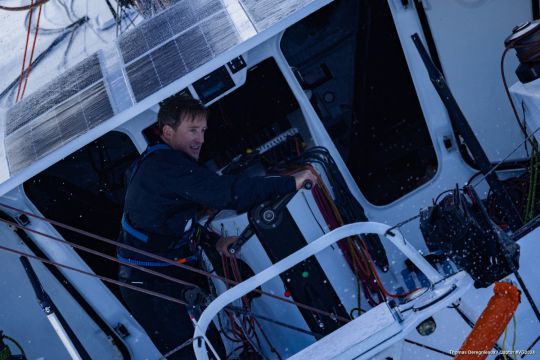
On such a challenging project, do you manage to find a replacement skipper?
I could have, but I don't have any. The risks I took in setting up the project are my own, and I couldn't see myself entrusting the boat to someone else. This is often the case with amateur projects.
In February 2024, at a Vendée Globe press conference, you announced that you were looking for sponsors? Have you finalized your budget yet? How much is your budget?
In the budget rankings, I'm right at the bottom. I have flocked the boat MS Amlin, but I haven't found the right partners. I've had to make compromises in preparing the boat and I'm leaving uncertain. I would have liked to find other partners.
What do you think of the class's commitments and the measures put in place to reduce its impact on the environment?
I think it's great. We're moving in the right direction. We should be moving more in that direction, but the IMOCA class is still pretty much a pioneer. It's easy to criticize and say that things aren't going fast enough, but it's a very good thing and we're going to keep accelerating.
What are your plans after the Vendée Globe?
In 2016, I asked the people around me, what's your Vendée Globe? For me, it inspired me to cross the world, to reinvent myself, to learn a new language, to train in a new environment... The answer was " for me, the Vendée Globe is about being the best dad I can be ", " Be the best pianist you can be ", " I have an entrepreneurial project that I can see myself tackling ".
I lack imagination now, but what I want is to get back on a par with the leaders. I want to put together a great project to compete with the leaders. I won my first round-the-world race in 2011-2012 and I want to have a chance to win again.
